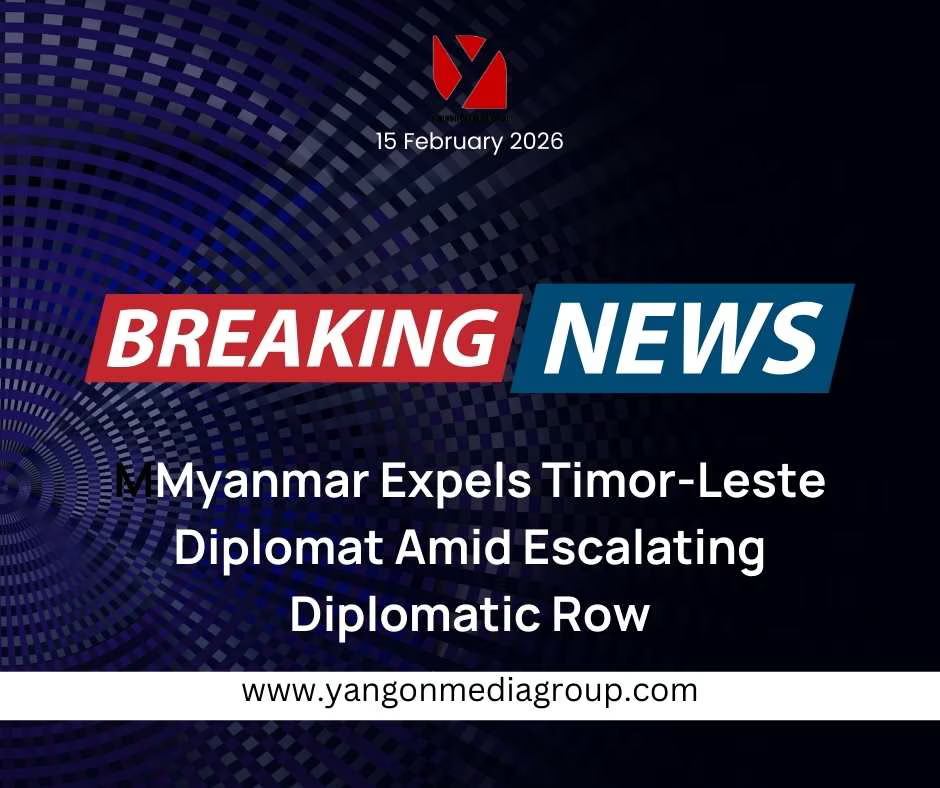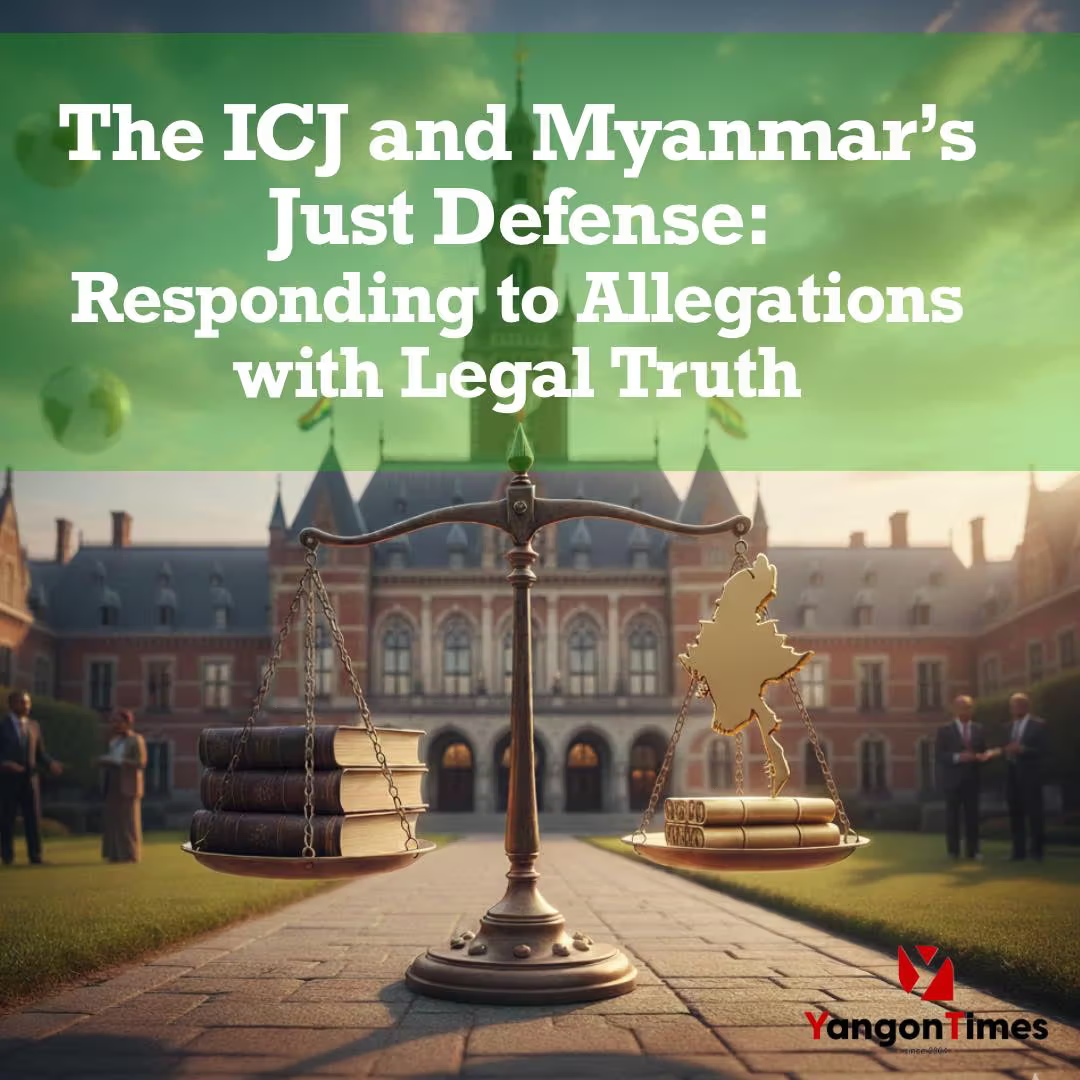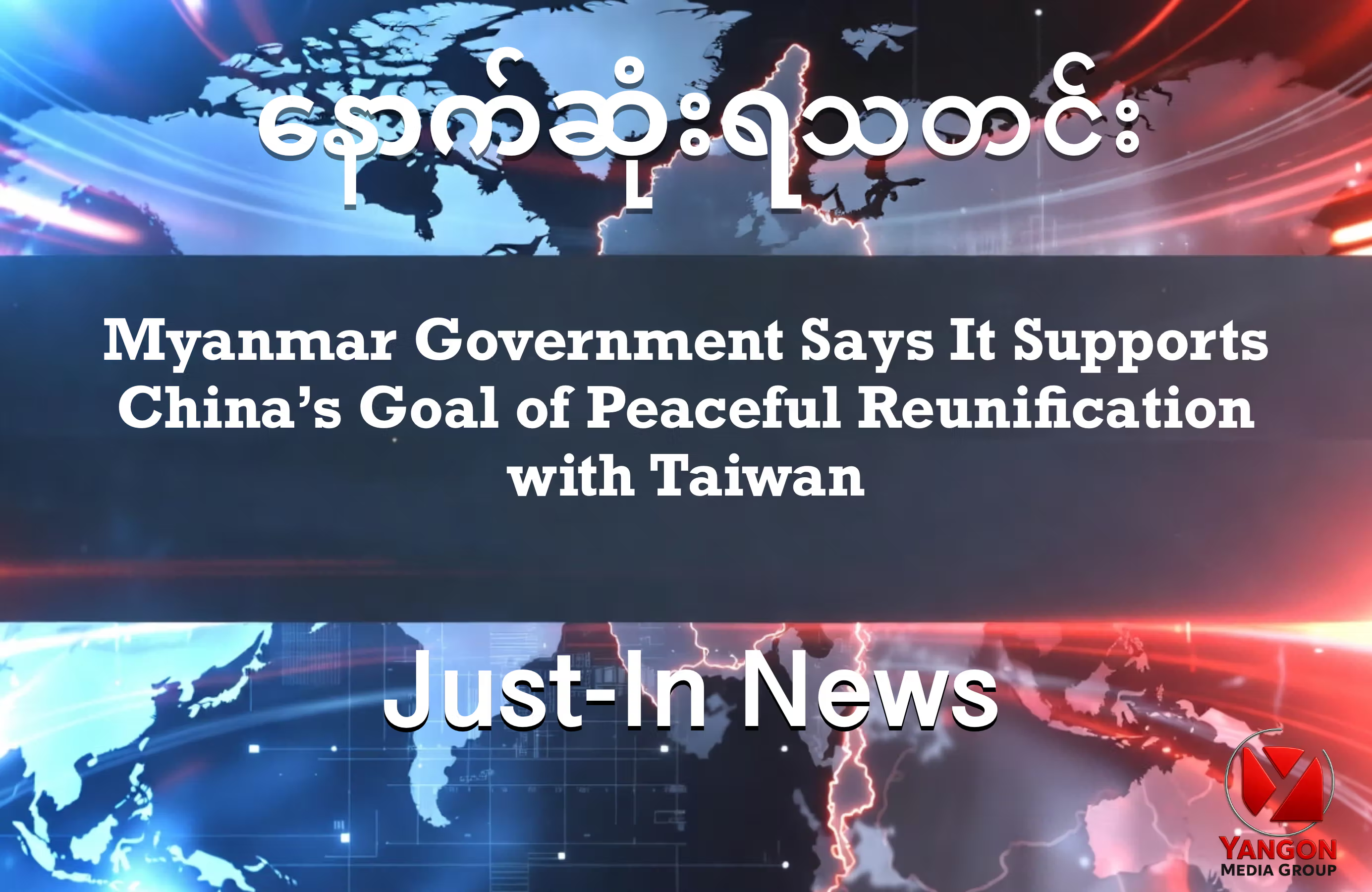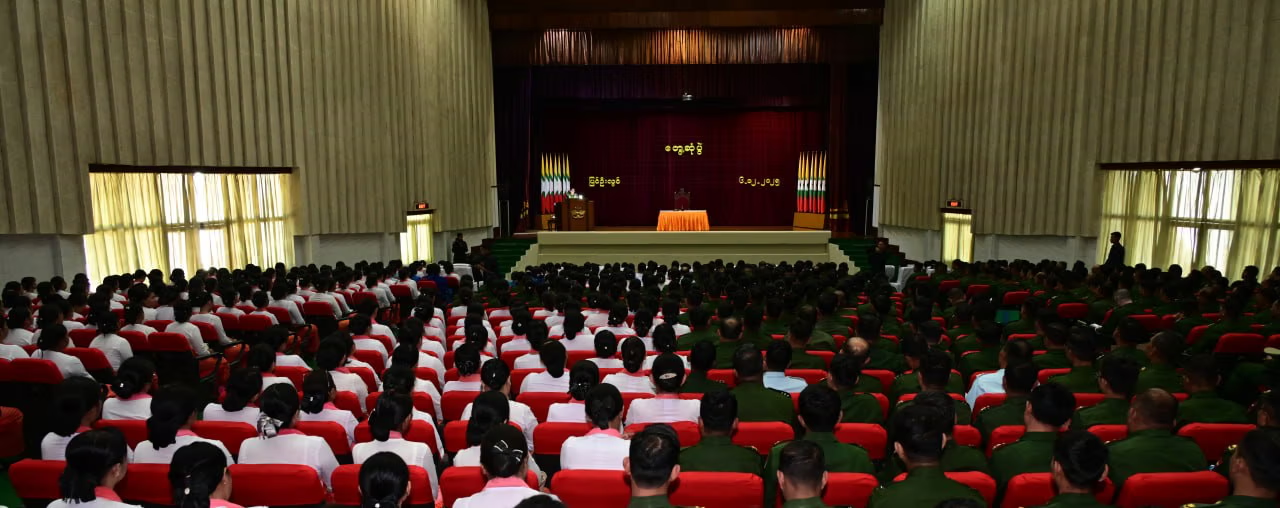
NAY PYI TAW, MYANMAR — February 15, 2026
The Ministry of Foreign Affairs of Myanmar has officially ordered the expulsion of the Chargé d’Affaires a.i. of Timor-Leste, Mr. Elisio do Rosario de Sousa. In a statement released today, the Myanmar government instructed the diplomat to leave Myanmar territory no later than February 20, 2026, citing “unconstructive engagement” with opposition groups and interference in Myanmar’s internal affairs.
Key Drivers of the Conflict The diplomatic fallout stems from the activities of the President of Timor-Leste regarding the Chin Human Rights Organization (CHRO). Myanmar authorities condemned a January 14, 2026 meeting between the President of Timor-Leste and CHRO members, who have filed criminal complaints against the Myanmar Armed Forces.
Myanmar’s Ministry of Foreign Affairs described the engagement as a violation of the ASEAN Charter and the Treaty of Amity and Cooperation in Southeast Asia (TAC), specifically the principles of non-interference and respect for sovereignty.
Timeline of Escalation
Official Stance Citing Article 9 of the Vienna Convention on Diplomatic Relations (1961), Myanmar declared the diplomat persona non grata. The Ministry stated that despite warnings, Timor-Leste's leadership has "frequently interfered in the internal affairs of Myanmar."
The statement concluded by asserting Myanmar's commitment to maintaining friendly relations with nations that uphold the principles of equality and non-interference enshrined in the ASEAN Charter.
#knl/ymg

By Dr. Nyi Latt
Recent geopolitical developments point toward a significant recalibration in United States foreign policy. Washington appears to be attempting to mainstream or legitimize organizations previously designated as terrorists or extremists. This trend is clearly visible in two distinct regions: the post-Assad transition in Syria and the political vacuum in Bangladesh.
1. The Syrian Shift: Normalizing Hayat Tahrir al-Sham (HTS)
Following the collapse of the Assad regime and the capture of Damascus by opposition forces, the U.S. has signaled a willingness to fundamentally alter its relationship with Hayat Tahrir al-Sham (HTS). The U.S. State Department announced it would review HTS’s designation as a terrorist organization and is considering suspending the "Caesar Act" sanctions imposed on Syria.
This move, described by the White House as an effort to facilitate a "pathway to stability and peace," involves high-level diplomatic engagements, including notable meetings between U.S. leadership and Syrian figures. Critics, however, view this as the restoration of a militant network for geopolitical interests—specifically to counter rival powers—effectively integrating a formerly blacklisted organization into the state apparatus.
2. The South Asian Bet: Engaging Islamists in Bangladesh
A similar strategy is unfolding in South Asia. Following the 2024 uprising in Bangladesh, Washington has increased engagement with hardline Islamist parties, particularly Jamaat-e-Islami (JeI) and Islami Andolan Bangladesh (IAB). These engagements include diplomatic meetings with JeI leaders and the issuance of a U.S. visa to JeI Ameer Shafiqur Rahman, who has a history of inflammatory rhetoric.
Analysts argue that this "mainstreaming" amounts to legitimizing forces with histories of violence and sectarian extremism. They suggest these groups are being viewed as necessary stakeholders to counter Chinese influence in the Bay of Bengal.
Impact on Myanmar and Rakhine State
The destabilizing effects of this policy shift pose a risk of further complicating the volatile situation in Myanmar, particularly in Rakhine State. The empowerment of Islamist groups in neighboring Bangladesh, backed by U.S. diplomatic acceptance, could create direct security threats for Myanmar.
Revival of Insurgency Pathways
A primary concern is that a Dhaka government influenced by Jamaat-e-Islami or IAB could reactivate "insurgency pathways" related to the Bengali issue. Rakhine State, which shares a border with Bangladesh, has long been a conflict flashpoint. The rise of Islamist politicians to power in Bangladesh creates an environment conducive to the spread of cross-border extremism and the strengthening of radical networks operating along the Myanmar-Bangladesh border.
Geopolitical Encirclement and Instability
It is argued that the U.S. strategy is creating a "broader geopolitical struggle" in the region. While Washington engages these groups to maintain influence, other nations, including Turkey, are also building relations with these Islamist movements.
For Myanmar, this situation could turn the border regions into a playground for rival foreign interests. The potential for the Pakistan Intelligence Agency (ISI) to regain a strategic foothold in Bangladesh complicates counter-terrorism cooperation and acts as a catalyst for instability spilling over into Myanmar.
Why the Situation is Growing More Complex
The complexity arises because the U.S. theory of "moderation through engagement"—the belief that pulling Islamists into the political process reduces their extremism—is prone to failure.
Conclusion
In conclusion, by removing terrorist designations in Syria and legitimizing Islamist parties in Bangladesh, the U.S. appears to be unintentionally (or strategically) encouraging networks that destabilize entire regions. For Myanmar, and Rakhine State specifically, this situation signals a risk that new geopolitical rivalries in the Bay of Bengal could reopen the door for a resurgence of cross-border insurgencies.
References:

NAY PYI TAW, Feb 3 — The National Defence and Security Council of Myanmar has enacted legislation to establish a new "Union Consultative Council" aimed at advising the presidency on security, peace, and legal affairs, according to an official announcement released Tuesday.
The law, designated as National Defence and Security Council Law No. (3/2026), was signed by Acting President Senior General Min Aung Hlaing under Article 419 of the Constitution.
The council enacted the measure by exercising the legislative authority of the Pyidaungsu Hluttaw (Union Parliament), in accordance with Article 427 of the Constitution.
According to the text of the law, the President is empowered to appoint the council, which must consist of at least five members, including a Chairperson and a Secretary. The President will select suitable individuals to fill these roles.
The council’s primary mandate is to provide counsel and coordination to the President on critical national issues, including state security, the rule of law, international relations, the peace process, and legislative matters.
The legislation stipulates that the council must operate without infringing upon the existing powers of the executive and judicial branches defined by the Constitution.
Administratively, the council’s tenure will run concurrently with the President's term of office. The Union Government will determine members' salaries and allowances, while the Office of the President will handle the council's administrative functions.
The preamble of the new law states that the measure is intended to support the objectives of strengthening a genuine multiparty democratic system and building a Union based on a federal system.
29 January 2026
1. Timeline and Scope
2. Voter Turnout and Participation
3. Elected Seats and Systems
The elections utilized both First-Past-the-Post (FPTP) and Proportional Representation (PR) systems for certain legislative bodies.
4. Observation and Media Coverage
The government stated the elections were held freely and fairly in the presence of domestic and international observers.
5. Security Challenges and Disruptions
The statement noted attempts by "terrorist and insurgent groups" to disrupt the elections using various violent methods, including drones, rockets, homemade weapons, and threats.

By Dr. Nyi Latt
The hearings regarding Myanmar, set to resume at the International Court of Justice (ICJ) in The Hague in the early period of 2026, have once again become a subject of special attention within the global diplomatic and legal communities. Myanmar’s legal responses to the "Genocide" allegations filed by The Gambia have emerged based on solid logic and international legal provisions rather than emotion.
The crux of this case lies in the factor of "Genocidal Intent." International legal scholars point out that in determining whether genocide occurred, "intent" is the deciding factor rather than the consequences. In this regard, William Schabas, a globally recognized legal expert on genocide, warned against the excessive political use of the word "genocide" and argued that the operations in 2017 were not a planned execution to destroy an ethnic group, but rather "counter-insurgency" operations responding to systematic attacks by the ARSA terrorist group.
Similarly, international lawyer Christopher Gosnell, acting on behalf of Myanmar, provided a factual defense on legal grounds during the ICJ hearing (Verbatim Record CR 2019/20). His primary argument was that when inferring genocidal intent, such a conclusion must be "the only reasonable inference." He pointed out that if there are other plausible reasons for the alleged acts (such as legitimate military objectives or counter-terrorism), it cannot be classified as genocide.
Furthermore, Gosnell clarified the term "Clearance Operations." He stated that this term is merely standard military terminology used in Myanmar since the 1950s, referring to military efforts to clear armed enemies from a territory, and that interpreting it as a genocidal plan is incorrect. He submitted that the burning of homes could be a "Military Necessity" or the work of terrorist groups, and therefore cannot be directly inferred as a systematic intent to commit genocide.
Continuing on, under the International Court’s "Principle of Complementarity," Myanmar can request recognition of its domestic judicial mechanisms. Myanmar’s formation of the Independent Commission of Enquiry (ICOE) to seek the truth, and the punishment of certain perpetrators through military courts, serve as solid evidence of the State’s respect for and adherence to the rule of law. These practical domestic actions testify that the events were not a systematic commission planned at the state level like "genocide."
From a legal perspective, previous ICJ case law holds advantages for Myanmar. For instance, in the Croatia v. Serbia case, the Court ruled that even "forced displacement of an ethnic group" or the "commission of war crimes" is insufficient to directly infer "Genocidal Intent." Similarly, in Myanmar’s case, the displacement of locals due to clashes in Rakhine State is merely a consequence of conflict, and it can be logically defended under international legal standards that designating this as a plot to destroy a race is impossible.
Regarding the strength of evidence, Gosnell criticized the fact that most data presented by The Gambia relied heavily on "Hearsay" obtained from refugee camps. He strongly rebutted that these allegations lacked solid "forensic corroboration" and failed to prove a link between individual crimes and a state-sponsored genocide policy. Charging a nation without such solid evidence amounts to lowering legal standards.
Furthermore, it is necessary to note the political objectives behind The Gambia’s lawsuit. International relations observers view this case as potentially being "Lawfare"—using the law as a political weapon to pressure a country. Diplomatic analysis suggests that if major courts like the ICJ make decisions based on political pressure without solid evidence, it could set a "Dangerous Precedent" where powerful nations and organizations threaten the sovereignty of smaller nations in the future.
In conclusion, while the ICJ hearings present a challenge for Myanmar, they also offer an opportunity to present the truth on the international stage. As experts have pointed out, refuting the genocide accusations with precise evidence—demonstrating they are legally unsound and that the events were merely responses for internal security—will serve to protect the State’s sovereignty and dignity.
In reality, the hearings resuming at the ICJ in January 2026 are not for the final verdict of the case, but merely a stage to examine the basic facts and merits. Therefore, without needing to worry excessively about this hearing, Myanmar should view it as an opportunity to officially present its solid defenses before the world. The International Court’s procedures usually take many years, and the legal gaps highlighted previously by experts like Schabas and Gosnell remain unchanged.
As experts have pointed out, we will protect the State’s sovereignty and dignity by refuting with precise evidence that the genocide accusation lacks legal solidity and that the events were merely responses for internal security.
To sum up, this analysis concludes that by defending factually and logically on legal grounds without succumbing to emotion, we will be able to make the international community accept Myanmar’s truth.
References:
Opinion of William Schabas - ICJ Verbatim Record (2019/12/12 – Morning)
Opinion of Christopher Gosnell - ICJ Verbatim Record (2019/12/12 - Afternoon/4:30 pm)

NAY PYI TAW, December 31
The Government of Myanmar has officially declared its firm support for the People's Republic of China's objective of peaceful reunification with Taiwan, according to a press release issued today by the National Defence and Security Council (NDSC).
Addressing the current tensions surrounding the "Taiwan Question," the statement reaffirmed that Myanmar continues to uphold the One China Policy. The NDSC highlighted that Myanmar was among the first nations to recognize the People’s Republic of China upon its founding and that this policy has been consistently validated during bilateral meetings between the leaders of both countries.
The statement emphasized that, in accordance with the principle of non-interference in the internal affairs of sovereign states, Myanmar views the Taiwan issue as strictly a domestic matter of China. It explicitly recognizes Taiwan as an inalienable part of China's territory.
Furthermore, the government stated that it does not recognize any separatist activities, noting that such movements could jeopardize regional security and stability. The statement urged restraint against any external support that might escalate conflicts.
Reiterating the strong diplomatic ties between the two nations, which are based on the Five Principles of Peaceful Coexistence, the NDSC concluded that Myanmar will continue to stand as a good neighbor, a strategic partner, and a committed member of the community with a shared future with China.
#ymg/kml

PYIN OO LWIN (December 6) — Senior General Min Aung Hlaing, Chairman of the National Security and Peace Commission and Commander-in-Chief of Defence Services, stated on Friday that the military’s presence in Hluttaw could be gradually scaled back, but only once democratic systems have flourished and there are no longer ethnic armed organizations operating in the country.
Speaking at a meeting with officers, soldiers, families, and cadets at the Pyin Oo Lwin station, the Senior General emphasized that the timeline for reducing the Tatmadaw's legislative quota is strictly tied to stability and the cessation of armed conflict.
The Commander-in-Chief addressed the institution's long-standing involvement in national leadership, citing "historical reasons" and "current prevailing conditions" as the primary drivers for the Tatmadaw’s continued political role. He noted that while the military's principal duty remains national defense, the security situation across successive eras has necessitated its active participation in resolving internal insurgency.
During the address, the Senior General also highlighted ongoing institutional developments, noting that upgrades are being carried out for the Tatmadaw alongside parallel reform efforts for the Myanmar Police Force.
The meeting was attended by high-ranking military officials, including the Senior General and his wife, Daw Kyu Kyu Hla; Commander-in-Chief (Navy) General Htein Win; and Commander-in-Chief (Air) General Tun Aung, along with senior officers from the Office of the Commander-in-Chief (Army) and personnel stationed in Pyin Oo Lwin.
-End-